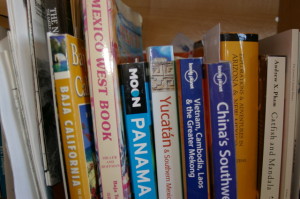 Maybe it had something to do with my dad being a geography teacher, but I love studying maps and reading up on history and foreign cultures. So I get a charge out of planning trips because it gives me a project that involves studying maps, history and cultures.
Maybe it had something to do with my dad being a geography teacher, but I love studying maps and reading up on history and foreign cultures. So I get a charge out of planning trips because it gives me a project that involves studying maps, history and cultures.
Yet I need to temper that with our love for exploring which includes discovering the unexpected, following whims, straying from any sort of plan and embracing serendipity. That’s the reason we turn our backs on organized tours and package deals.
For me the ultimate travel adventure is to arrive at a place you’ve never visited, with very little prior knowledge, and figure out transportation, where to eat and sleep, what dangers you should avoid and what really cool stuff you need to see. But when your time is limited, you don’t want waste a day trying to find a hotel or figure out how to get around.
And at this point in our lives, our travel time is limited to trips lasting about two and a half weeks at the most. So here’s how we design our own tour that maximizes our time exploring, and minimizes our time futzing around with day-to-day basics.
Buy the airline tickets.
Once we’ve decided on a destination, we buy airfare without any real details of our itinerary once we land. Buying our plane tickets without much of a plan gives us a little sense of adventure and commits us to the trip.
About the only research we do is to make sure we can pull off a decent trip in the timeframe we have. For example, we may want to fly into one city and out of another. Before buying the tickets, I do a few searches online to make sure it’s feasible to travel from City A to City B — in the manner we like to travel and in the time we’ve given ourselves.
Look through some guidebooks.
Guidebooks are great for leading you to all of the cool sites and best hotels in an area. They also lead everyone else to those same places. We’re aware of this and take their advice with caution, but they do give us a framework to build a rough itinerary. Even better, they can give you an overview of all the basics you’ll need to deal with just to travel such as:
- Best places to change money
- How to get around
- Dealing with local scams and dangers
- Awareness of cultural and legal issues
Put together a short list of hotels.
I don’t like to be searching around for a place to sleep when we’ve been traveling all day, or when I can hear the beach and a frozen cocktail calling my name. I use TripAdvisor.com to come up with a short list of hotels for each of the cities I’m 90 percent sure we’re going to visit.
This is probably the most time I spend planning. A guidebook can make it easier because they list the hotels for you, but I like to have more choices. In the past I’ve written down the name, address and phone of these hotels in the back of my travel notebook. For our upcoming trip to Portugal and Spain, I typed them into Word, saved it as a PDF file and put it on my Kindle.
Leave a bank of open days.
We usually don’t sit in one spot for too long when we travel. But we leave it open that we just might like to stay somewhere longer than planned, or take a side trip to a place a local or another traveler tells us about.
The most important part of this is that we don’t bite off more than we can chew in our allotted time. If all we’re doing is a marathon to get from City A to City B, I think we’ll be disappointed.

Leave a Reply